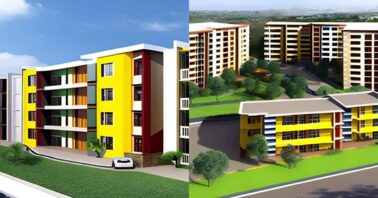There’s something magical about holding your own house keys for the first time. That sense of stability. The pride of calling a place your own. For most Kenyans, owning a home is a life goal, a sign that you’ve made it. But let’s be real: very few people have millions stashed away to buy a house in cash. That’s where mortgages come in. The challenge? Knowing which one is right for you.
Let’s be honest, mortgages can feel a bit overwhelming at first, especially with all the banking jargon thrown around. But once you strip away the complex terms, it’s not as intimidating as it seems. In fact, understanding the basics is quite doable. So, let’s simplify things. Here’s a clear breakdown of the main types of mortgages available in Kenya, so you can move forward with clarity and confidence on your homeownership journey.
READ ALSO: Securing Your Home Loan: Top Tips to Avoid Mortgage Rejection
Table of Contents
Fixed-Rate Mortgages: For the Predictable Planner
A fixed-rate mortgage is exactly what it sounds like—the interest rate is set when you take the loan, and it stays the same throughout your repayment period. That means your monthly installments won’t change, even if interest rates go up or down in the wider market.
This type of mortgage is ideal if you value consistency and want to avoid surprises. It’s especially helpful if you’re working with a fixed budget and want to plan your finances without second-guessing. On the flip side, fixed-rate mortgages often come with slightly higher initial rates, and you won’t benefit if the market rates drop during your repayment period.
Variable Rate Mortgages: For the Risk-Tolerant Dreamer
With a variable-rate mortgage, your interest rate is tied to market trends. If interest rates fall, your repayments go down. If they rise, so do your monthly costs. This can be a good option if you expect rates to drop or if you’re only planning to stay in the property short-term.
While the potential savings are tempting, it’s important to prepare for uncertainty. Budgeting can become tricky when you’re not sure how much you’ll owe month to month. This type of mortgage is best suited for borrowers who can absorb financial fluctuations without strain.
Construction Mortgages: For the Hands-On Home Builder
If you’re building a house from the ground up rather than buying one, a construction mortgage could be your best option. Unlike traditional mortgages, these loans are disbursed in stages, often called tranches, based on the progress of your building project.
Before you qualify, you’ll need approved architectural plans and a registered contractor on board. Lenders typically send a valuer to assess progress before releasing each installment. This structure ensures the money is used as intended and helps keep the construction timeline in check.
Interest-Only Mortgages: For the Short-Term Strategist
Interest-only mortgages allow you to pay just the interest for a specified period, usually the first few years. This means lower monthly repayments in the beginning, which can be useful if your income is expected to grow or if you’re investing that extra cash elsewhere.
However, once the interest-only period ends, your monthly repayments will increase significantly as you begin paying off the principal. It’s a smart tool when used strategically but can be risky if you’re not financially prepared for the eventual shift.
Buy-to-Let Mortgages: For the Aspiring Landlord
If your goal is to buy property as an investment, say, to rent out apartments or Airbnbs, a buy-to-let mortgage is specifically designed for that. Here, lenders will consider the rental income potential when assessing your loan application.
Keep in mind that the rental market can be unpredictable. Always do your research on location, demand, and pricing before diving in. And remember, being a landlord comes with its own set of responsibilities beyond the loan.
READ ALSO: Is a Fixed-Rate Mortgage or a Variable Rate Mortgage Better?
Conclusion
Choosing a mortgage is more than ticking boxes at the bank, it’s a commitment that can shape your financial life for years. Take time to understand the different options, ask questions, and compare what’s available across lenders.
At the end of the day, the best mortgage is the one that matches your lifestyle, your income, and your long-term vision. Whether you’re buying, building, or investing, knowing your options puts you in a stronger position to move forward confidently.
Homeownership isn’t just about bricks and mortar, it’s about building the life you want. And it all starts with making the right financial choice.



